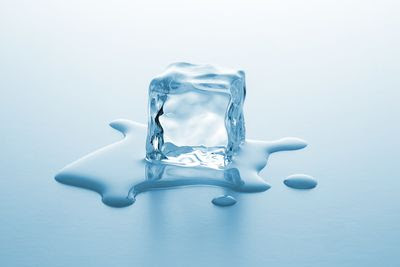Experiments (การทดลอง)
ภาพประกอบจากอินเตอร์เนต
Experiments are one way to answer questions.
การทดลองเป็นวิธีหนึ่งในการตอบคำถาม
If your child asks you "How long does it take for an ice cube to melt?", the two of you can do an experiment to find out.
ถ้าเด็กถามว่า ก้อนน้ำแข็งทรงลูกบาศหลอมหมดใช้เวลาเท่าไหร่ คุณทั้งสองก็สามารถใช้การทดลองเพื่อหาคำตอบ
Take an ice cube out the freezer, put it in a bowl on the counter and time how long it takes to melt.
เอาก้อนน้ำแข็งออกจากช่องแช่วางลงในกาละมังบนโต๊ะและเริ่มจับเวลาว่านานไท่าไหร่กว่าน้ำแข็งละลายหมด
That's the simplest type of experiment where you are watching a phenomenon.
การเฝ้าดูปรากฏการนั้นเป็นการทดลองที่ง่ายที่สุดวิธีหนึ่ง
That basic experiment can lead to more questions and more advanced experiments.
การทดลองขั้นพื้นฐานสามารถนำไปสู่คำถามอีกมากและการทดลองในระดับที่ก้าวหน้าหรือซับซ้อนมากขึ้น
After watching the ice cube melt, most kids will start to ask more questions.
หลังจากการเฝ้ามองการละลายของน้ำแข็ง เด็กส่วนใหญ่ก็จะเริ่มถามคำถามเพิ่ม
What could we have done to make the ice cube melt faster?
เราจะมำให้น้ำแข็งละลายได้เร็วๆอย่างไร
What would make it melt slower?
ทำยังไงให้น้ำแข็งละลายช้าลง
Experiments are one way to answer questions.
การทดลองเป็นวิธีหนึ่งในการตอบคำถาม
If your child asks you "How long does it take for an ice cube to melt?", the two of you can do an experiment to find out.
ถ้าเด็กถามว่า ก้อนน้ำแข็งทรงลูกบาศหลอมหมดใช้เวลาเท่าไหร่ คุณทั้งสองก็สามารถใช้การทดลองเพื่อหาคำตอบ
Take an ice cube out the freezer, put it in a bowl on the counter and time how long it takes to melt.
เอาก้อนน้ำแข็งออกจากช่องแช่วางลงในกาละมังบนโต๊ะและเริ่มจับเวลาว่านานไท่าไหร่กว่าน้ำแข็งละลายหมด
That's the simplest type of experiment where you are watching a phenomenon.
การเฝ้าดูปรากฏการนั้นเป็นการทดลองที่ง่ายที่สุดวิธีหนึ่ง
That basic experiment can lead to more questions and more advanced experiments.
การทดลองขั้นพื้นฐานสามารถนำไปสู่คำถามอีกมากและการทดลองในระดับที่ก้าวหน้าหรือซับซ้อนมากขึ้น
After watching the ice cube melt, most kids will start to ask more questions.
หลังจากการเฝ้ามองการละลายของน้ำแข็ง เด็กส่วนใหญ่ก็จะเริ่มถามคำถามเพิ่ม
What could we have done to make the ice cube melt faster?
เราจะมำให้น้ำแข็งละลายได้เร็วๆอย่างไร
What would make it melt slower?
ทำยังไงให้น้ำแข็งละลายช้าลง
One option at this point is to take a moment and create a hypothesis about ice cubes and melting.
ณ จุดนี้ ทางเลือกหนึ่งคือ ใช้เวลาและสร้างสมมติฐานเกี่ยวกับน้ำแข็งและการละลาย
สมมติฐาน - การคาดเดาจากประสบการณ์และความรู้ที่มี
ณ จุดนี้ ทางเลือกหนึ่งคือ ใช้เวลาและสร้างสมมติฐานเกี่ยวกับน้ำแข็งและการละลาย
สมมติฐาน - การคาดเดาจากประสบการณ์และความรู้ที่มี
Another option is just to help your child set up a series of tests.
อีกทางเลือกนึงคือช่วยเด็กๆกำหนดการทดลองต่อไป
อีกทางเลือกนึงคือช่วยเด็กๆกำหนดการทดลองต่อไป
Whether you are creating a science fair project, using a hypothesis or just experiment for fun, let's define a few of the terms.
ไม่ว่าคุณจะทดลองวิทยาศาสตร์ด้วยการใช้สมมติฐานหรือแค่การทดลองเพื่อความสนุก ก็มาทำความเข้าใจกับคำเหล่านี้กันเถอะ
ไม่ว่าคุณจะทดลองวิทยาศาสตร์ด้วยการใช้สมมติฐานหรือแค่การทดลองเพื่อความสนุก ก็มาทำความเข้าใจกับคำเหล่านี้กันเถอะ
Independent variable - something that is changed in the experiment.
ตัวแปรอิสระ คือบางสิ่งที่มีการเปลี่ยนแปลงในการทดลอง
ตัวแปรอิสระ คือบางสิ่งที่มีการเปลี่ยนแปลงในการทดลอง
Dependent variable - something that responds to the Independent variable.
ตัวแปรที่ไม่เป็นอิสระ คือบางสิ่งที่ตอบสนองหรือมีผลจากตัวแปรอิสระ
ตัวแปรที่ไม่เป็นอิสระ คือบางสิ่งที่ตอบสนองหรือมีผลจากตัวแปรอิสระ
Constant Variable - something that is kept the same throughout the series of experiments.
ตัวแปรคงที่ คือบางสิ่งที่ไม่มีการเปลี่ยนแปลงตลอดการทดลอง
ตัวแปรคงที่ คือบางสิ่งที่ไม่มีการเปลี่ยนแปลงตลอดการทดลอง
Control - similar test where the independent variable is left unchanged to provide a comparison.
การควบคุม คือการทำการทดลองแบบเดียวกันแต่กำหนดให้ตัวแปรอิสระไม่เปลี่ยนแปลงเพื่อใช้ในการเทียบเทียบผล
การควบคุม คือการทำการทดลองแบบเดียวกันแต่กำหนดให้ตัวแปรอิสระไม่เปลี่ยนแปลงเพื่อใช้ในการเทียบเทียบผล
To continue with our ice cube melting experiment,
มาต่อกับการทดลองการละลายของน้ำแข็ง
the next question might be "Would the ice cube melt faster if it was in little pieces?"
คำถามต่อมาอาจเป็นน้ำแข็งจะละลายเร็วขึ้นไหมถ้าเป็นก้อนเล็กลง
You could set-up a test where you have one ice cube that is broken into little pieces on one plate, and a whole ice cube on a plate beside it.
คุณสามารถทำการทดลองโดยใส่น้ำแข็งที่ทุบให้แตกเป็นชิ้นเล็กๆแล้วในถาดใบหนึ่ง และวางที่เป็นก้อนๆในถาดอีกใบหนึ่ง
Then you would time how long it takes each ice cube to turn into water.
จากนั้นก็จับเวลาในแต่ละถาดตั้งแต่เริ่มจนกระทั่งน้ำแข็งละลายเป็นน้ำหมด
มาต่อกับการทดลองการละลายของน้ำแข็ง
the next question might be "Would the ice cube melt faster if it was in little pieces?"
คำถามต่อมาอาจเป็นน้ำแข็งจะละลายเร็วขึ้นไหมถ้าเป็นก้อนเล็กลง
You could set-up a test where you have one ice cube that is broken into little pieces on one plate, and a whole ice cube on a plate beside it.
คุณสามารถทำการทดลองโดยใส่น้ำแข็งที่ทุบให้แตกเป็นชิ้นเล็กๆแล้วในถาดใบหนึ่ง และวางที่เป็นก้อนๆในถาดอีกใบหนึ่ง
Then you would time how long it takes each ice cube to turn into water.
จากนั้นก็จับเวลาในแต่ละถาดตั้งแต่เริ่มจนกระทั่งน้ำแข็งละลายเป็นน้ำหมด
The independent variable is the size of the pieces of ice, it changed between the two tests.ตัวแปรอิสระ คือ ขนาดของก้อนน้ำแข็ง มีขนาดที่เปลี่ยนไประหว่างสองการทดลอง
One of the constant variables would be the temperature in the room, it stays the same for both tests.
ตัวแปรคงที่ตัวหนึ่งคือ อุณภูมิในห้อง มีค่าเท่ากันสำหรับทั้งสองการทดลอง
ตัวแปรคงที่ตัวหนึ่งคือ อุณภูมิในห้อง มีค่าเท่ากันสำหรับทั้งสองการทดลอง
The control would be the whole ice cube that is melting.
การควบคุมก็คือการละลาของน้ำแข็งทั้งหมด
การควบคุมก็คือการละลาของน้ำแข็งทั้งหมด
The dependent variable would be the time it takes the ice cube to melt.
ตัวแปรที่ไม่เป็นอิสระ ก็จะเป็น เวลาที่ใช้ในการละลายของน้ำแข็ง
ตัวแปรที่ไม่เป็นอิสระ ก็จะเป็น เวลาที่ใช้ในการละลายของน้ำแข็ง
That variable is dependent on the size of the pieces of ice.
ซึ่งตัวแปรนี้จะขึ้นอยู่กับขนาดของน้ำแข็ง
ซึ่งตัวแปรนี้จะขึ้นอยู่กับขนาดของน้ำแข็ง
พยายามแปลตรงๆจากบางส่วนของบทความจาก
http://www.sciencekidsathome.com/science_fair/what_is_an_experiment.html
http://www.sciencekidsathome.com/science_fair/what_is_an_experiment.html


ความคิดเห็น
แสดงความคิดเห็น